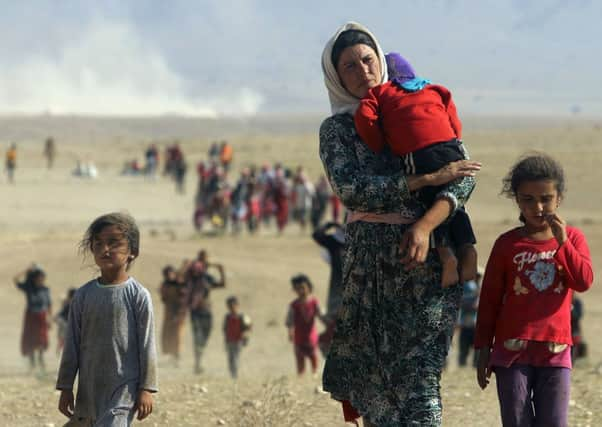Comment: We have lost our moral direction


The caliphate established by the Islamic State (IS, formerly Isis) is imposing its will in Syria and Iraq. It is, we know a death cult, and it is dealing death. But there is no spasm of public outrage, no marches as there are against Israel. The very visibility of the evidence of horrendous crimes seems to inoculate against them. The shock doesn’t just shock, it numbs and inures. The very availability of smartphones and access to social media that means we can view the atrocities also normalises them. How else to explain the BBC producer who asked a jihadist to come on to a programme to discuss his favourite Robin Williams film.
Maybe our confusion is justified. Our leaders certainly seem no clearer about what they think. David Cameron voted for the Iraq war then turned against it and said “we cannot drop democracy from 10,000ft”. The Prime Minister then reversed and decided to liberate Libya with Tomahawk missiles and Tornados. Finally, he decided to intervene in the Syrian civil war – a pretty messy and murky conflict, as most are close up. But he couldn’t bring the Commons with him, so has gone back to the isolationist position he first held.
Advertisement
Hide AdAdvertisement
Hide AdAs the introduction to the US sitcom Soap used to say after its initial plot summary – “Confused? You should be.”
The essence is absence. Absence of a moral compass. The Prime Minister says that the UK is a “Christian country”. I disagree, but it’s a point of view. The difficulty is it doesn’t seem to mean anything in practice. You would have thought that a Christian country would be concerned about the persecution and execution of co-religionists abroad. Apparently not.
It’s the absence of an anchor, too. Beliefs that underpin actions, values that enable you to say I am doing this because I believe that.
Those bracelets with the initials WWJD – What Would Jesus Do – are infinitely mockable, but they make a very human claim too. They say that there should be – and indeed is – a consistent approach to how you live your life.
It’s what we all try to do too with friends and family, at work and at play we aim to have a consistency of actions. We’re not different on different days, that kind of inconsistency is called flakiness or unreliability. That is certainly not what we look for in leaders.
We demand of them unusual and unbending levels of consistency. Coupled with an exceptional ability to explain and persuade. Leadership is – in the end – about judgment. That is what is so confusing about the Prime Minister. First he didn’t want to be Blair – wrong, but understandable. Then he wanted to be Blair – understandable, if poorly executed. Now he wants to be not Blair again – confusing, and impossible to understand.
As Groucho Marx said: “Those are my principles, and if you don’t like them, well, I have others.”
If our leaders won’t lead, in a very modern way we need to make them follow us. To do this, we should listen to our hearts. If we are outraged by something – as so many are by the attempted massacre of the Yazidis – we shouldn’t suppress those feelings.
Advertisement
Hide AdAdvertisement
Hide AdWe are outraged because something outrageous is happening. The adult who has never said “something must be done” is heartless to the core, and what is life without a heart, without compassion? So, there is a time for action.
Some disdain the pressure for a recall of parliament, saying – in effect – that it is just a talking shop and that to reconvene will just expose its powerlessness. I disagree, for politics to regain the broad respect that it needs to have in a healthy democracy it needs to be seen to be able to channel the feelings of the public. Symbols have power, so does symbolic action.
But anger and passion are not enough, we need a metric for intervention and one for success. To establish the first we need to take the legacy of the recent past head on. By which, I mean, the past 25 years. Britain failed to prevent genocide in Rwanda or ethnic cleansing and murder in former Yugoslavia. It was not just shameful, it was a deliberate abandonment of the promises we made after the Second World War. It should not need saying, but it does, we should do all we can – and more – to prevent genocides. There is one being executed right now in Iraq, and we should be rescuing Yazidis not wringing our hands.
From this flows a second point. The Treaty of Westphalia is no longer operative. We cannot look at evils being perpetrated in another country and say that is their matter and no concern of ours. Bloodless pragmatism has had its day. So has cutting and running, this is the third point.
Part of our measurement of intervention has to be success in stabilising and rebuilding a country. In all honesty, that takes decades not months. Strategic patience, not warfare, was how we eventually liberated eastern Europe from Communist oppression. That’s what we need from our leaders – and we should expect that, indeed demand it. Instead, we have a sort of political ADHD with politicians distracted by the daily polls and the new headlines. We too have a responsibility. What has happened to the Nigerian girls kidnapped by Boko Haram? They haven’t been released, the media cycle has moved on. We have a duty to remember and to remind.
We live in the richest of times. We are the best educated and best informed generation. We are the most connected – it took a fortnight for Nelson’s victory at Trafalgar to reach Pitt in London. Today’s massacres are relayed in real time. Our responses should be as swift.